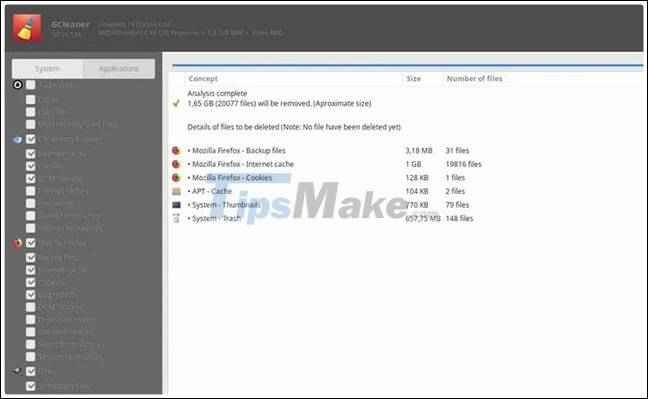Top 5 best Linux system cleaning tools
However, the manual cleaning will be extremely time consuming while the efficiency is not really high. Instead, you should use specialized system cleaning tools. Let's take a look at some of the most notable names below.
1. Stacer
Stacer is an open source system monitoring and optimization tool that can make cleaning the system even simpler for Linux enthusiasts. This is arguably one of the best Linux system cleanup tools out there, especially its ability to free up hard drive space, help you lighten your system and maintain older Linux installations.

You can use Stacer to remove packet caches, report crashes, application logs, and caches. However, sometimes clearing app cache can slow down your application. Make sure you do not clear the cache for frequently used applications like web browsers.
2. BleachBit
BleachBit is a reliable system cleaning tool that can help you to save significantly on asia storage space by wiping unnecessary files from your Linux computer. You can use BleachBit to clean cache, cookies, history and temporary files, as well as many other types of junk data. In addition, it can also clean application data for many popular Linux software such as Firefox, GIMP, KDE, APT and Vim.

In particular, BleachBit's ability to hide previously deleted files makes it an extremely suitable tool for those who focus on security. You can also use BleachBit to remove unwanted language files as well as to clean up virtual RAM (SWAP). BleachBit's whitelisting feature is also a big plus, making it easy to protect essential system data files.
3. Sweeper
Sweeper is a simple yet feature-rich system cleaning tool for Linux. It is designed to help you clean up your open source operating system. Especially, if you are sharing the same Linux PC with many others for personal or work reasons, you can even hide your activities through Sweeper.

In addition, Sweeper makes it easy to reclaim free storage space by deleting unnecessary files. Applications can delete clipboard content, web and shell history, cache, thumbnails, and many other types of data. Sweeper will be a great choice for those looking for a reliable system cleaner.
4. GCleaner
GCleaner is one of the lightest system cleaning tools available for Linux platforms. It provides an intuitive graphical interface, making it extremely simple to delete junk files on the system. Moreover, the open source nature of the application also allows users to easily test the source code and make necessary customizations.

You can use GCleaner to delete temporary files, Internet cookies, cache, history, etc. Overall, this is a great CCleaner alternative for Linux users.
5. Ubuntu Cleaner
Ubuntu Cleaner is a free and open source system cleaner that runs on all of today's popular Linux distributions, not just Ubuntu. This cleanup utility's simple user interface makes it very easy to use for the novice. Ubuntu Cleaner makes it easy to free up hard drive space occupied by junk data.

Alternatively, you can also use Ubuntu Cleaner to clear your browser cache, APT cache, thumbnails, outdated packages, settings, kernels, and more. This application is available through the PPA, so you can try it out without developing from source.